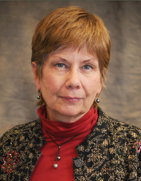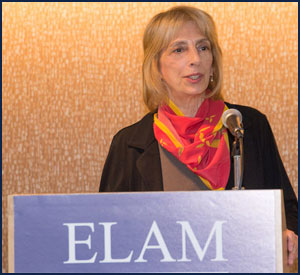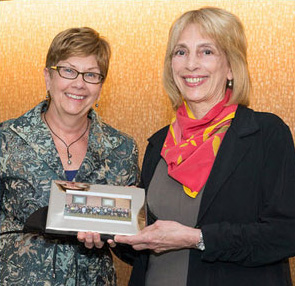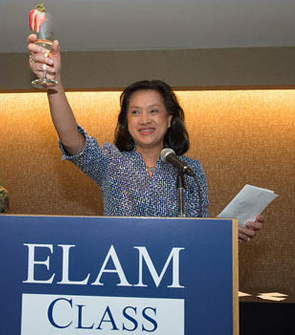Message from the Director - May 2013

Diane Magrane
Director of Executive Leadership Programs
Seven Lessons from a Life in Academic Medicine
Dr. Susan Shurin was a professor of pediatrics and oncology at Case Western Reserve University School of Medicine when she attended ELAM from 2000 to 2001. We were delighted when she accepted our invitation to address the Class of 2013 and to share her journey from CWRU medical school to the university president's office to her current role as deputy director of the National Heart, Lung, and Blood Institute. She was able to attend the full Leaders Forum, including the poster presentations and symposium on institutional action projects (IAP), bringing her full circle to her own IAP, an organizational analysis of clinical faculty educational support and the impact of a new faculty practice plan. In preparing her introduction, I looked up her ELAM homework assignments and found her project reports to be very interesting and timely. She identified a need to align expectations and rewards of clinical faculty for teaching and the inherent challenges of implementing health care systems among faculty who are inherently entrepreneurial. (The more things change, the more they stay the same!) Her insights into the relationships of personal response and organizational challenge are clear in her address to the class. "Seven Lessons from a Life in Academic Medicine" reveals her reflections on effective communication, personal agency, and innovating within our academic missions as we advance the goals of those missions.
As deputy director of the NHLBI at NIH, I oversee 1,000 employees and the investment of 3 billion U.S. taxpayer dollars in training and research on heart, lung and blood diseases, most of which comes to the institutions in which you work. I came to NIH a little over seven years ago in this position, spent the past three years as the institute's acting director, and now have a new director. I have built a global health research program focused on chronic diseases, chair the board of the Global Alliance for Chronic Diseases, and am trying to restructure how we do clinical and epidemiological research, as well as redefine programs that the NHLBI has supported for decades.
I spent most of my career on the faculty at Case Western Reserve University in Cleveland, where I was professor of pediatrics and oncology. I had a cell biology lab with R01 funding, which I exited when I was abruptly made director of a busy clinical division with extreme conflict. I have lived in hospital, medical school and university administration, taught graduate and medical students, residents and fellows, and invested a lot of energy tilting at windmills, none of which I regret despite many failures. I went to college during the civil rights era, and medical school during Vietnam. When I graduated from medical school, seven percent of physicians were women. My elder son was born when I was a fourth year medical student and my younger when I was chief resident in pediatrics. Over the 42 years since I graduated from medical school, I've had some horrible and wonderful experiences. I would like to share a few of the lessons I've learned from making many mistakes and occasionally getting things right.

ELAM 2013 graduation speaker Susan Shurin.
Can you hear me now?
My first set of observations has to do with communication. Professional life has much in common with a cell phone conversation in which both parties are wondering, "Can you hear me now?"
When I was an intern at Johns Hopkins, the call schedule was every other night and every other weekend. It was totally brutal. My husband, close friends, and I — all on the Harriet Lane Home service at Johns Hopkins but in different years of training — shared child care arrangements. Our wonderful chief resident made this manageable and tolerable by coordinating all of our call schedules. The conversations that led to this arrangement taught me that there were rational, well-meaning people who were invested in our success — if only because failure created problems for them. Framing the conversation as "How can we make this work?" instead of "I need you to make allowances for me" was incredibly helpful.
Lesson #1: Identifying common interests is equivalent to checking the number of bars on your cell phone to ensure you have reception. There's more to being heard than the volume at which you speak.
When I was a fellow in hematology at Boston Children's, we took call a week at a time. I rapidly determined that this was absolutely intolerable. My program director and lifelong mentor loved to say that "hematology is a jealous mistress and your family has to adjust." I explained to him that I was more than willing to work hard, but this schedule had to change, and two bells rang for him. The first was that he was worried that none of the women he had trained had stayed in academics, and that this reflected on him. The second was that he began to see what was ahead for his own two teenage daughters. We changed the call schedule. All the men in the program came to thank me for doing this. They hated the call schedule, too, but would never have said anything.
Lesson #2: It is much easier to speak up when something you love is at risk. In this instance, it was my children.
Fifteen years later, I was on the Acute Lymphoblastic Leukemia Strategy Group in the Children's Cancer Group. We were designing the next generation of clinical trials. I made suggestions, everyone listened respectfully, but then the conversation continued as if I had not even spoken. At a break, I took aside a senior member of this entirely male group and asked him to help me find the flaws in my suggestion. He said, "There aren't any — it's the best idea all day." He then raised the exact same idea, and the entire discussion changed direction. At the end of the meeting, we took the group leaders aside and pointed out that he had just repeated my idea, and that the group needed to learn to hear women's voices. Their behavior changed radically. Now I sit at the table with Francis Collins, Tony Fauci and Harold Varmus — all of whom have strong opinions and voices — and who must be able to hear me if I am to be an effective leader of my Institute, and they do. I make sure of that.
Lesson #3: To be an effective leader, your ideas must be heard. An interpreter can be useful, but eventually you need to learn the language.
As you can imagine, I hear from a lot of disappointed grant applicants and administrators. Last year, a department chair called to complain that one of his faculty member's grants was not funded. He considered her an early stage investigator (and, thus, qualifying for additional points), but she was a year too far out to meet the NIH criteria. He then accused me of sexism, saying that she had borne two children within the past few years, and that should be taken into account. I pointed out that mechanisms exist to stop the clock and give her the extra time she needed, but that it is his job to see that she knows this and applies for the extension. It had not occurred to him to even look into this. This kind of situation creates a big challenge as our faculties become more diverse.
Lesson #4: "You just don't understand" doesn't fix anything. We must change the conversation — being a good mentor and sponsor means learning what the options are for problems you didn't face yourself.

Diane Magrane's gift of a framed photo of the class inscribed with an important ELAM reminder to "always lead with your strengths" will be displayed in the director's office at the National Institutes of Health.
You know more than you think you do
My second set of observations is that Dr. Spock was right: "You know more than you think you do." Often, we don't even recognize the options we have.
My grandparents were amazing people. My grandfather was a pediatrician and social activist fighting for civil rights in St. Louis in the 1920s. My grandmother was a suffragette, chaining herself to lampposts. Her sister became a pediatrician, created the neonatal nursery systems which exist now, and wrote important public health legislation. Both made life decisions right after WWI when women either had careers or got married, but few did both. My grandmother should have had a career and my great aunt should have been able to have a family. My mother quit college after two years to marry my father. My brothers and I learned that a woman whose economic existence depends on a man is powerless and vulnerable; this lesson has impacted all our lives and choices. I was told that it was impossible to have a family and a career, but learned from the regrets of my relatives, and was delighted to discover that it was merely incredibly difficult.
Lesson #5: No one should define your goals and values but you. You do know more than you think you do.
Last fall, I joined a lab retreat of a training program in Germany. All the leaders were German men, and 12 of the 30 trainees were women. Both the faculty and the trainees had great anxieties about their readiness for a rapidly changing world. The senior men were concerned about their ability to mentor the new generation of women trainees, and the women trainees were sensitive to their lack of senior role models. Many of the trainees are international, so there are cultural and ethnic as well as gender issues. A prominent concern of the women stunned me: "We are given 18 months of maternity leave. How do we come back to an academic career after that?" Both the women and the international trainees were more prepared to drop out than to work to change the culture. They didn't see themselves as empowered to do so. We had a long discussion about whose responsibility this was.
Lesson #6: A new generation needs to hear Mahatma Gandhi's exhortation to "Be the change that you wish to see in the world."
It's time to change the rules!
My third set of observations is that it's time to change the rules — they aren't working for anyone. The entire future of academic medicine is at risk unless we figure out how to fundamentally reconfigure its component parts.

Evelyn Gopez acknowledges the class's graduation and successful fundraising for a gift to the Legacy Fund. Welcome Alumnae!
For the past 60 years, we have been hearing about the vanishing physician scientist. With David Ginsburg of the University of Michigan, I co-chair a working group of the advisory committee to the director of the NIH to examine the future of clinician scientists — physicians, dentists, veterinarians and others. Our charge is focused on what the NIH can do, since we are advisory to Francis Collins, but we have rapidly agreed that even with more resources than we have, the biggest issues are out of NIH control. Demographics, economics, time demands, regulatory pressures, changing cultural values have brought us to a point at which we need to fundamentally re-conceive the entire enterprise. The most frightening part of my conversation with the trainees in Germany was that the entire group seemed to think it was somebody else's ("society's") responsibility to make things change. The most heartening thing about being at ELAM is that I know that this generation of leaders knows that if we don't make things happen, things will turn out all wrong.
Lesson #7 is from Walt Kelly's Pogo: "We have met the enemy, and he is us."
The challenge, which you have been addressing over the past year, is for academics to learn to practice disruptive innovation. We have all been trained to adhere to standards of practice, avoid mistakes, respect hierarchy and authority, and work within microcosms without appreciating the context and systems in which we are functioning. As you finish your time in ELAM, you are coming into positions of leadership of very broken systems, which nonetheless have great strengths and virtues. Diane, Page and Roz will tell you that you won't feel the full impact of the ELAM program for several years, and if it's had its desired effect, it will gradually change the way you think and approach problems. We are desperately in need of leaders who will challenge existing paradigms, approach errors as inevitable manifestations of the creative process, and critique accepted wisdom.
The view from the NIH looks like this. We need entirely new paradigms for academic medical careers, for health care delivery, and for research funding. The emphasis needs to be on systems as well as their individual components, and with a lot of attention to how they connect and interact. Loosely coupled systems often expend more resources on their differences than what they have in common. That must change.
In two decades, you will retire from a world that looks very different from this one, and how it looks depends upon what you do individually and collectively. We live in an interesting time, messy and chaotic, with infinite capacity for you to mold it. We're counting on you to develop new models for healthcare systems, for support and conduct of research, and for education. You are struggling with how to do these things, but the passion, energy, intelligence, skills and leadership which you bring to these activities are the greatest hope for positive change in the systems in which we live and work, advancing science and improving health. Don't be afraid to try, to fail, and try again.
ELAM is a core program of the Institute for Women's Health and Leadership at Drexel University College of Medicine, Philadelphia, Pa. The Institute continues the legacy of advancing women in medicine that began in 1850 with the founding of the Female Medical College of Pennsylvania, the nation's first women's medical school and a predecessor of today's Drexel University College of Medicine.